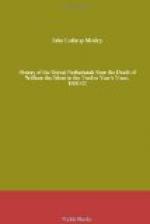Isabella bore the disappointment and the bitter intelligence of the defeat with a stoicism worthy of her departed father. She had already had intimations that the day was going against her army, and had successively received tidings that her husband was killed, was dangerously wounded, was a prisoner; and she was now almost relieved to receive him, utterly defeated, but still safe and sound.
Meantime the mad chase continued along the beach and through the downs. Never was a rout more absolute than that of Albert’s army. Never had so brilliant a victory been achieved by Hollander or Spaniard upon that great battleground of Europe—the Netherlands.
Maurice, to whom the chief credit of the victory was unquestionably due, had been firm and impassive during the various aspects of the battle, never losing his self-command when affairs seemed blackest. So soon, however, as the triumph, after wavering so long, was decided in his favour—the veteran legions of Spain and Italy, the picked troops of Christendom, all flying at last before his troops—the stadholder was fairly melted. Dismounting from his horse, he threw himself on his knees in the sand, and with streaming eyes and uplifted hands exclaimed, “O God, what are we human creatures to whom Thou hast brought such honour, and to whom Thou hast vouchsafed such a victory!”
The slaughter went on until nightfall, but the wearied conquerors were then obliged to desist from the pursuit. Three thousand Spaniards were slain and about six hundred prisoners were taken. The loss of the States’ army; including the affair in the morning at Leffingen, was about two thousand killed. Maurice was censured for not following up his victory more closely, but the criticism seems unjust. The night which followed the warm summer’s day was singularly black and cloudy, the army was exhausted, the distance for the enemy to traverse before they found themselves safe within their own territory was not great. In such circumstances the stadholder might well deem himself sufficiently triumphant to have plucked a splendid victory out of the very jaws of death. All the artillery of the archduke—seven pieces besides the two captured from Ernest in the morning—one hundred and twenty standards, and a long list of distinguished prisoners, including the Admiral Zapena and many other officers of note, were the trophies of the conqueror. Maurice passed the night on the battle-field; the admiral supping with him in his tent. Next morning he went to Ostend, where a great thanksgiving was held, Uytenbogart preaching an eloquent sermon on the 116th Psalm. Afterwards there was a dinner at the house of the States-General, in honour of the stadholder, to which the Admiral of Arragon was likewise bidden. That arrogant but discomfited personage was obliged to listen to many a rough martial joke at his disaster as they sat at table, but he bore the brunt of the encounter with much fortitude.




